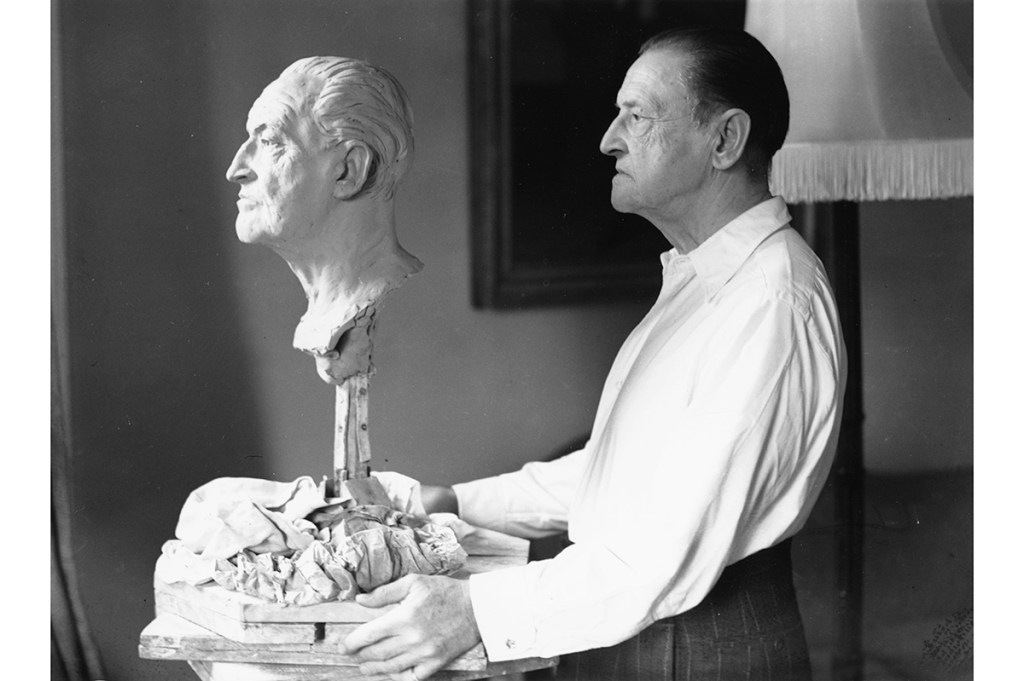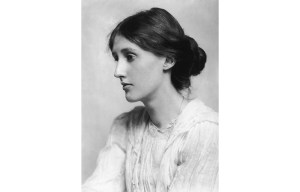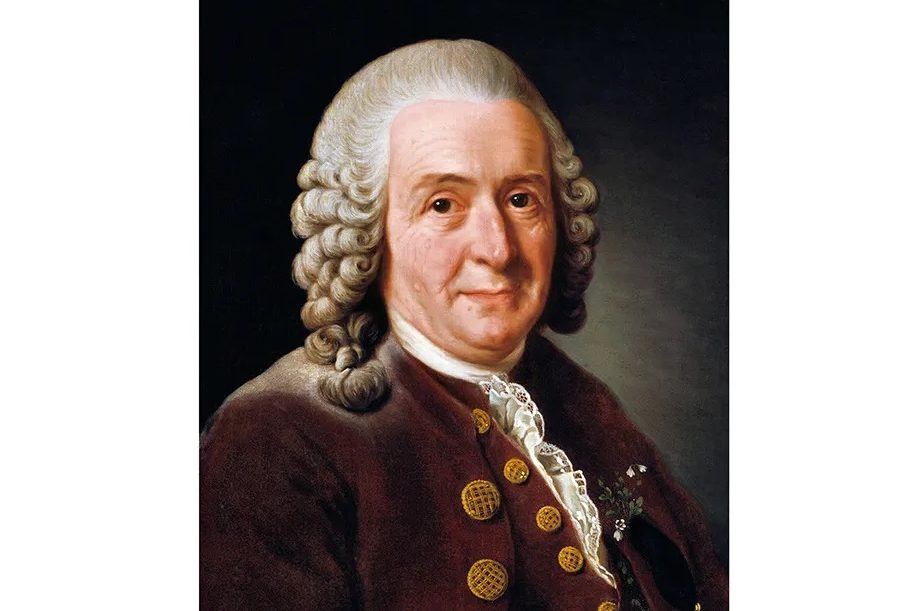The convention is that if you happen to meet authors and have just bought or acquired a book of theirs, you ask them to sign it. Particularly stuffy authors might refuse, but in most cases they feel flattered and duly inscribe your name and theirs on the title page or the flyleaf of the book in question. If the mood is right, they may add ‘with best wishes’ or something of the sort. At a superficial level, of course, such signatures are only the equivalent of an autograph album. There’s more to it than that, however. Added value perhaps, but association certainly. The human race lives by the stories we tell ourselves about our identity and our purposes, and that signature helps to make the author’s story part of the reader’s story.
Somerset Maugham
Don Fernando
, 1950
As a boy, I was under the impression that Maugham was the greatest living writer, and if not the greatest, surely the most famous. Early in his own literary career, my father had got to know him and in 1953 took me to stay with Maugham at Cap Ferrat in the South of France. I was impressed. You went into what appeared an endless vista of black and white flags on the floor. Then there was a very large drawing room. Martinis were mixed at half past twelve; there were two or three before lunch and the same again at six o’clock. I was very conscious of the Master upstairs in his study, at work. He would come down for a walk and this would be the central part of the day. I was taken around the garden by him, very slowly, with Alan Searle, who’d been his secretary before becoming his partner. Maugham was particularly friendly to me and anxious to know if I’d read his books and what the young thought of them. The movements of his mouth as he overcame his stammering gave him the look of a Galapagos tortoise. It was night and I was in my room about to go to sleep when he came in and sat on the bed. I was slightly apprehensive, but all he did was to give me this copy of Don Fernando carefully inscribed, ‘For David, when he goes to Spain from his ancient friend W. Somerset Maugham.’
Kingsley Amis
The Folks that Live on the Hill
, 1990
A diary entry dated February 1964 describes Kingsley coming to the office of The Spectator to organize a letter of protest to the Times of London. (I was then the literary editor, David Watt the foreign affairs correspondent and Joan the telephone operator.) ‘Flitting from room to room, he borrows a pound off David Watt, off Joan, off the managing director, the fatuous Mr Elliott. “I’ve got a girl downstairs, a bit tight, who I’m screwing…” At about two thirty he wants to take the boys out to lunch. He is wearing a green fake-Austrian leather jacket with silver buttons and a red leather tie. “Rather natty.” The boys are David Watt and myself. The girl downstairs is Elizabeth Jane Howard. We go to the Greek restaurant on Whitfield Street. Amis drinks most of a bottle of retsina and then another of Greek brandy. We leave, pulling him out, at four. “What’s the hurry?” he blurts.’
My diary continues, ‘Amis ringing me about the Aldous Huxley book on science and literature. “I had a glance through it this morning on the john, it’s no bloody good at all.”’
Aldous Huxley
Island
, 1962
I met Aldous Huxley in the bleak service flat in Chelsea where he was staying during his visit in 1961. The sitting room was colorless, the walls beige and bare. Huxley had a very distinguished appearance. His was the impressive face of someone who followed the advice of Socrates and led an examined life with whatever degree of resignation. He pitched his words slowly and carefully in what I imagined was the way intellectual undergraduates had enunciated in the Oxford of his day.
He also had fortitude. Some months previously, a forest fire had burned out his house in California and everything in it. Gone was correspondence from friends, for instance D.H. Lawrence, Lady Ottoline Morrell and Bertrand Russell. There could be no question now of writing his memoirs. The loss of his past, he said, was ‘a particularly cruel way of enforcing the teaching of the saints and mystics’. On the other hand, he went on, this was preparation for the greater loss soon to come. In an act of desperate courage at the last possible moment, he had risked entering the blazing house in order to rescue the finished manuscript of Island that had been lying on his desk prior to its dispatch to the publishers.
Just before leaving, I asked which of his novels he thought was his best, to which he answered that it was for others to say, and what was my opinion about Point Counter Point?
W.H. Auden
Collected Shorter Poems, 1927-57
, 1966
Auden lived in New York but spent summers in Kirchstetten, a village not far from St. Pölten in Lower Austria. His was a face like nobody else’s, wrinkled and deeply furrowed all over like some animal’s hide, possibly due to age but more likely to inner distress. ‘A wedding cake left out in the rain’ was Dom Moraes’s image for the devastated appearance.
Receiving me at the house in Kirchstetten, Chester Kallman launched into a critique, evidently well prepared, of the village and its inhabitants. He had lived with Auden since before the war. Also in the house was a Greek teenager.
Auden was at work in what had been the loft of a farm building tacked on to one side of the house and converted into his study. There on the desk were drafts of poems and sheets of paper with word games, acrostics and aphorisms. I copied down a line of rhymes: blot, dot, jot, got, what.
At the end of the afternoon, Auden wobbled his way down the staircase and Kallman gave him a martini, and 10 minutes later another, and 10 minutes after that a third. By the time Kallman and the Greek teenager had got him to bed, it was about half past seven and he was past making sense. They gave him a flask of Chianti, and he lay on his side sucking at it like a baby with a bottle, gurgling, splashing red wine now and again onto the sheets and over himself.
Next day, I gave them a lift to Vienna. Kallman was making up to the Greek teenager, with much laughter between them as they directed me to the gay bar where I was to drop them. Uninvited, left sitting by himself on a red plush sofa in Sacher’s Hotel, Auden was a picture of distress.
Michael Grant
Greeks and Romans
, 1982
He inscribed more of his books for me than any other author. They seem to be potboilers only because he had a gift for making scholarship look easy.
Paul Bowles
Two Years Beside the Tangier Strait
, 1990
I had not been back to Tangier since childhood. At the time of the German blitzkrieg in May 1940, my parents were in England, having left me in France in the care of my aunt and uncle. I have described in Fault Lines our flight from the Germans, first to Vichy France and from there to Spain and Morocco. Tangier meant safety, food, blue sky and permanent sunshine. In 1968 I returned with my wife Clarissa and could show her the house I’d lived in; the bench on which I’d sat to watch the British fleet steaming out of Gibraltar in the pale grey dawn; the Marshan where I had played football with Arab boys my age; the casbah and the Petit Socco, the busy heart of Tangier.
The city had since become a sort of open-air nightclub for drugs and sex-tourism of every kind. In an old file I had preserved the address of Paul Bowles — Apartment 20, Immeuble Itesa, telephone number 17883. It was an uninhabitable dump of cheap stained cement blocks, without even a minimum concession to domesticity. Here he lived with the solemn, not to say surly, Muhammad Mrabet. Introduced as a writer with whom Bowles went gathering traditional tribal tales that he published under his own name, Mrabet was in fact functionally illiterate.
They spent the day smoking kif, the cannabis grown in Morocco. The smell of it impregnated not just the dark and shuttered room but the entire building. Draped around him in various stages of trance was a troop of beachcombers and freeloaders, pimps and prostitutes of both sexes, dreamers, worshippers of the Jane Bowles cult, and somewhere in the mix a published poet or two.
Robert Graves
Collected Poems, 1975
As I was making plans to interview him, Graves’s wife Beryl reminded me that Robert was 81, hinting that it wasn’t really worthwhile to fly out to Majorca. The village of Deya, then unspoiled, sits on a rocky height above the shore and with a view of the Mediterranean beyond. They lived in a sizable house he’d built there before World War Two. He looked like one of the ancient gods, with a mystique about him. The white curls of his hair and a gladiator’s nose broken boxing long ago suggested an antique bust. On one finger was a scarab and on another an Arab amulet and round the neck a Maori talisman of some green stone. He asked me to guess what they were.
A steep descent through trees led to the seashore. There was no proper path. Graves and I were slipping and sliding on leaf mold, pebbles, twigs and so on. I must have been thinking to please Graves when I quoted Virgil, facilis descensus Averni (the descent to Avernus is easy). But as I was pronouncing the place name I had a sudden doubt about its case. Could it be Averno? I made a noise that might cover alternatives. Disproving Beryl’s fear of his loss of memory, Graves immediately picked up my prevarication. ‘What was that last word?’ ‘Averni’, I plunged right in. He growled.
Signatures: Literary Encounters of a Lifetime is published by Encounter Books ($29).

























